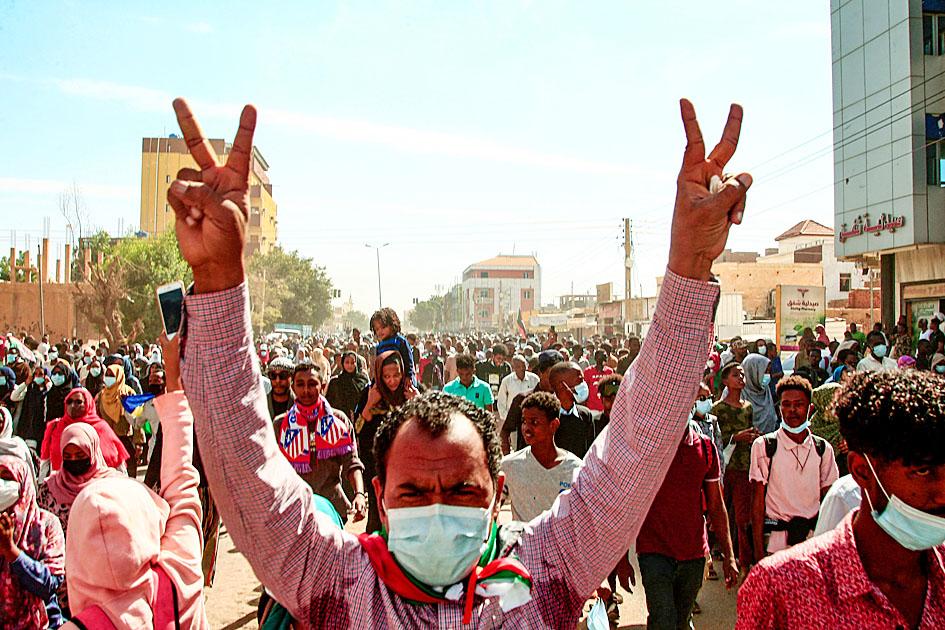Sudanese Prime Minister Abdalla Hamdok resigned on Sunday, more than two months after a military coup and following another deadly crackdown on protesters, with the military now firmly in control.
Sudan had been undergoing a fragile journey toward civilian rule since the 2019 ouster of former Sudanese president Omar al-Bashir, but was plunged into turmoil when military leader General Abdel Fattah al-Burhan launched his coup on Oct. 25 and detained Hamdok.
Hamdok was reinstated on Nov. 21 under a deal promising elections for the middle of next year, but local media had reported that he had been absent from his office for days, with rumors swirling over his possible resignation.

Photo: AFP
“I have tried my best to stop the country from sliding towards disaster,” Hamdok said on Sunday evening, addressing the nation on state television.
Sudan “is crossing a dangerous turning point that threatens its whole survival,” he said.
Hamdok was the civilian face of the nation’s fragile transition, while al-Burhan has been the nation’s de facto leader following al-Bashir’s ouster.
Hamdok cited “the fragmentation of the political forces and conflicts between the [military and civilian] components of the transition,” and said that “despite everything that has been done to reach a consensus ... it has not happened.”
Mass protests against the coup have continued even after Hamdok was reinstated, as demonstrators distrust al-Burhan and his promise to guide the nation toward full democracy.
Protesters have also charged that the deal to reinstate Hamdok simply aimed to give a cloak of legitimacy to the generals, whom they accuse of trying to continue the regime built by al-Bashir.
Thousands of demonstrators on Sunday braved tear gas, a heavy troop deployment and a telecommunications blackout to demand a civilian government.
They lambasted the coup, shouting “power to the people” and demanding the military return to their barracks at protests near the presidential palace in the capital, Khartoum, and its twin city, Omdurman.
The pro-democracy Doctors’ Committee said that security forces killed three protesters, including one who was shot in the chest and another who suffered a “severe head wound.”
As with previous demonstrations, which have become regular since the coup, the authorities had erected roadblocks, with shipping containers blocking Nile River bridges between the capital and outlying areas.
However, thousands still came out to demonstrate “in memory of the martyrs,” with at least 57 protesters now killed since the coup, according to pro-democracy medics.
Young men on motorcycles were seen ferrying wounded protesters to hospitals as security forces blocked ambulances from reaching them.
Web monitoring group NetBlocks said that mobile Internet services were cut in the morning ahead of the protests, the first of the year. They were restored in the evening.
Democracy advocates use the Internet for organizing protests and broadcasting live footage of the rallies.
US Secretary of State Antony Blinken on Saturday said that Washington was “prepared to respond to those who seek to block the aspirations of the Sudanese people for a civilian-led, democratic government, and who would stand in the way of accountability, justice and peace.”
More than 14 million people in Sudan would need humanitarian aid in the coming year, the UN Office for the Coordination of Humanitarian Affairs has said — the highest level in a decade.

MAKING WAVES: China’s maritime militia could become a nontraditional threat in war, clogging up shipping lanes to prevent US or Japanese intervention, a report said About 1,900 Chinese ships flying flags of convenience and fishing vessels that participated in China’s military exercises around Taiwan last month and in January have been listed for monitoring, Coast Guard Administration (CGA) Deputy Director-General Hsieh Ching-chin (謝慶欽) said yesterday. Following amendments to the Commercial Port Act (商港法) and the Law of Ships (船舶法) last month, the CGA can designate possible berthing areas or deny ports of call for vessels suspected of loitering around areas where undersea cables can be accessed, Oceans Affairs Council Minister Kuan Bi-ling (管碧玲) said. The list of suspected ships, originally 300, had risen to about 1,900 as

Japan’s strategic alliance with the US would collapse if Tokyo were to turn away from a conflict in Taiwan, Japanese Prime Minister Sanae Takaichi said yesterday, but distanced herself from previous comments that suggested a possible military response in such an event. Takaichi expressed her latest views on a nationally broadcast TV program late on Monday, where an opposition party leader criticized her for igniting tensions with China with the earlier remarks. Ties between Japan and China have sunk to the worst level in years after Takaichi said in November that a hypothetical Chinese attack on Taiwan could bring about a Japanese

Right-wing political scientist Laura Fernandez on Sunday won Costa Rica’s presidential election by a landslide, after promising to crack down on rising violence linked to the cocaine trade. Fernandez’s nearest rival, economist Alvaro Ramos, conceded defeat as results showed the ruling party far exceeding the threshold of 40 percent needed to avoid a runoff. With 94 percent of polling stations counted, the political heir of outgoing Costa Rican President Rodrigo Chaves had captured 48.3 percent of the vote compared with Ramos’ 33.4 percent, the Supreme Electoral Tribunal said. As soon as the first results were announced, members of Fernandez’s Sovereign People’s Party

MORE RESPONSIBILITY: Draftees would be expected to fight alongside professional soldiers, likely requiring the transformation of some training brigades into combat units The armed forces are to start incorporating new conscripts into combined arms brigades this year to enhance combat readiness, the Executive Yuan’s latest policy report said. The new policy would affect Taiwanese men entering the military for their compulsory service, which was extended to one year under reforms by then-president Tsai Ing-wen (蔡英文) in 2022. The conscripts would be trained to operate machine guns, uncrewed aerial vehicles, anti-tank guided missile launchers and Stinger air defense systems, the report said, adding that the basic training would be lengthened to eight weeks. After basic training, conscripts would be sorted into infantry battalions that would take